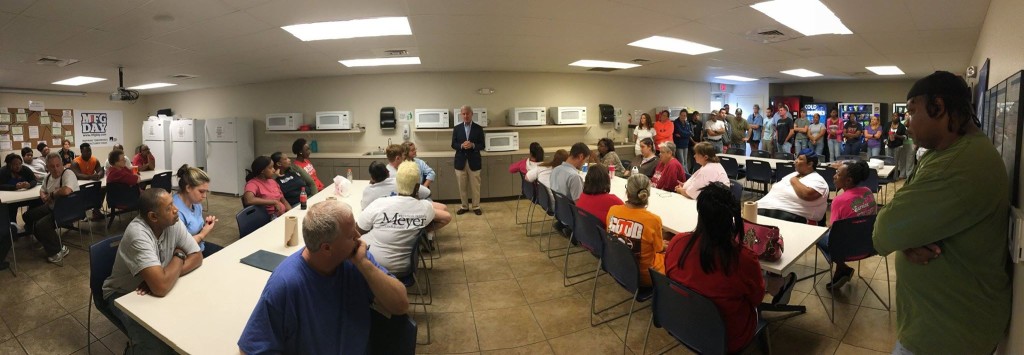High court raises doubts about temporary presidential picks

The Supreme Court on Monday raised doubts about the temporary appointment of a former labor official in a case that could limit the president’s power to fill top government posts. The justices considered whether Lafe Solomon was allowed to serve as acting general counsel of the National Labor Relations Board while he was at the same time nominated to fill that role permanently. The outcome of the case could affect the next administration if the new president and the Senate remain at odds over nominations to agencies at the center of partisan political fights. It also raises questions about the validity of decisions made by a half-dozen other temporary officials who still have nominations pending. President Barack Obama named Solomon acting general counsel in June 2010 and he held the office until Nov. 4, 2013. But he was never confirmed by the Senate, where Republicans saw him as too favorable to labor unions. At issue is a 1998 law that seeks to prevent the president from using temporary appointments to bypass the Senate’s advice-and-consent role. A federal appeals court ruled last year that Solomon’s tenure was invalid under the complex requirements of the law. Acting Solicitor General Ian Gershengorn told the justices that the lower court ruling upends a settled understanding of the law that has been used to nominate more than 100 people over nearly two decades. He said Congress never objected to any of those officials. “It was very much the dog that didn’t bark,” he said of Congress’ silence. But during the hourlong argument, it seemed that justices across the ideological divide were skeptical about the government’s reading of the law. Chief Justice John Roberts said congressional inaction over the practice does not mean lawmakers believed it complied with the law. “That might not be a partisan battle they want to fight at that time,” he said. Justice Ruth Bader Ginsburg said she was not persuaded by interpretations of the law from the Justice Department’s Office of Legal Counsel and the Government Accountability Office that sided with the administration. The case began when an Arizona-based ambulance company accused of unfair labor practices argued that Solomon was serving in violation of the Federal Vacancies Reform Act. The U.S. Court of Appeals for the District of Columbia Circuit sided with the company, SW General, Inc. The law says that once an official is nominated for a post requiring Senate confirmation, that person can’t serve in the same position on a temporary basis. There is an exception if the nominee served for 90 days as a “first assistant” to the person who previously held the office. The Obama administration says the law doesn’t prevent the president from tapping other senior officials as temporary fill-ins even if they are also formally nominated for the post. That was the case with Solomon, who was director at a different office at the NLRB. Arguing for the ambulance company, Shay Dvoretzky said the law allows federal agencies to run smoothly by keeping the first assistant in place and not bringing in someone else. Others, like Solomon, have “no accountability” to the Senate. Justice Stephen Breyer seemed worried about a ruling that would disrupt the continuity of government agencies by forcing the president to choose a temporary official who may not be the best leader. A ruling is expected by the end of June. Republished with permission of the Associated Press.
Bradley Byrne: Manufacturing on the rise, but challenges remain

As I was touring the manufacturing operation at Quality Filters in Robertsdale, I was struck by just how much manufacturing has grown in Southwest Alabama over the last decade. I paid a visit to Quality Filters to help celebrate National Manufacturing Day, which took place on October 2nd. We have seen a large increase in manufacturing all over Alabama, driven by our growth in the motor vehicle, chemical, and aerospace industries. In 2014, over 250,000 Alabamians worked in manufacturing. These manufacturing jobs paid an average of $60,945 while the average pay for other non-farm businesses was $41,089. All told, manufacturing had a $34.4 billion impact on Alabama’s economy. Despite these impressive gains, manufacturers in Southwest Alabama and across the country are facing a wide range of challenges brought on by the federal government. Whether it is the EPA, IRS, NLRB, or OSHA, manufacturers must deal with regulations from an alphabet soup of federal regulators. Even if you don’t work for a manufacturer, that does not mean these regulations won’t impact you. The regulatory costs are often passed on to the consumer in the form of higher prices or fewer options. The Environmental Protection Agency (EPA) is likely the biggest foe of manufacturing. Given the nature of the industry, manufacturers use a third of our nation’s energy, so they depend on affordable energy prices. Unfortunately, it seems like every day the EPA is putting out a new regulation that will drive up energy costs. Take the EPA’s new ozone standard for example. The new standard is misguided and will be incredibly costly for our nation’s manufacturers. In fact, the new standard is so low that even some national parks could be out of compliance. At a time when ozone levels have already been reduced, it makes no sense to place additional burdens on our job creators. In Congress, I have been a strong supporter of the REINS Act. This commonsense legislation would require Congressional approval of any regulation with an annual economic impact of $100 million or more. Many of the EPA’s proposed rules would fall under this category, and I am certain the Republican-controlled Congress would stop these costly regulations from moving forward. The National Labor Relations Board (NLRB) has also attempted to increase the number of labor regulations impacting manufacturers. The NLRB’s “ambush elections” rule will shorten the time it takes to hold a union election and make the personal contact information of employees publicly available to union representatives. Earlier this year, the House and the Senate passed legislation to block the ambush election rule from going into effect. Unfortunately, President Obama vetoed the bill, and the Senate did not have the votes to override the veto. Despite that setback, we are continuing to push back against frivolous NLRB regulations on manufacturers. Another challenge to manufacturers comes in the form of a growing skills gap. Our nation is currently experiencing a shortage of skilled workers to fill certain manufacturing jobs. Without access to enough skilled workers, it’s becoming harder and harder for manufacturers to grow and expand their operations. As a member of the House Education and the Workforce Committee, I have made it a top priority to improve our nation’s job training programs. We need to encourage collaboration between the private sector and institutions of higher learning, specifically community colleges and trade schools. This will help close the skills gap and give more Americans access to high paying jobs. So while manufacturers are facing some significant challenges, there are also those of us in Congress who are committed to supporting manufacturing. So whether it is Quality Filters or other businesses in our area, I will do everything I can to support manufacturing and the thousands of jobs associated with the industry. Bradley Byrne is a member of the U.S. Congress representing Alabama’s 1st Congressional District.
Bradley Byrne: Putting small business over big labor

“I now find myself in the position that an unelected board in Washington, D.C., can just unilaterally determine that my American dream is over.” Those were the words of Chris Holmes, owner and operator of Firehouse Subs restaurants in the Florida panhandle, during a House Education and the Workforce Committee field hearing in Mobile. As a member of the Committee, I worked with my colleagues to convene a field hearing in Mobile to examine the latest attempt by President Obama and his National Labor Relations Board (NLRB) to dramatically change our nation’s labor laws. The NLRB is an independent federal agency responsible for setting policies related to labor practices and unions. Field hearings are just like any other Congressional hearings we would have in Washington except we have them back home in our local communities. They allow us to get closer to the actual people who are impacted by the policies that are being debated in Washington. In other words, it brings the issues down to Main Street. That was especially important on this issue, which will have a direct impact on local small business owners and their employees. The hearing focused on a proposal to completely change the definition of a “joint-employer” under the National Labor Relations Act. While this issue may sound complicated, let me explain why it should matter to every American. A lot of people in Southwest Alabama work for franchisees, which is someone who owns a local business that is an affiliate of a big national brand. For example, someone in Escambia County may own a local franchise of McDonalds or another fast food restaurant. The people who work for them are not employees of the fast food chain, but they are employees of a local small business person who owns that individual store. The issue isn’t limited to just fast food. One of the people who testified at our field hearing in Mobile is a veteran who owns a residential painting company that is part of a larger franchise operation. These franchise relationships are really common and very important to the local economy and our national economy. They give thousands of individuals upward mobility and the opportunity to be successful business owners. What the National Labor Relations Board is attempting to do is say that anybody who is currently a franchisee employee will no longer be an employee of that local business owner, but instead they will be the employee of the larger, national company. This fundamentally alters three decades of legal precedent. The Wall Street Journal explained that the NLRB is attempting to “radically rewrite U.S. labor law and upend thousands of business relationships.” This decision could crush the dream of hardworking Americans, like Chris Holmes, who have always aspired to own a small business. This action by the NLRB could increase the liability of doing business and change the franchisor-franchisee relationship. Another franchisee testified that the NLRB’s action would give him “less independence and less control over the business that I worked so hard to build.” Worst of all, this wouldn’t just be bad for small business owners, but it would hurt the thousands of people who work for small businesses. Instead of having a boss who knows you and understands your problems, now your boss may be a corporate CEO who has never even stepped foot in your local business. President Obama and the NLRB have yet again sided with Big Labor over what is in the best interest of the American people, but Congress won’t stand by idly. I look forward to working with my colleagues on the Education and the Workforce Committee to roll back this flawed decision and stand up for hardworking Americans. Bradley Byrne is a member of the U.S. Congress representing Alabama’s 1st Congressional District.


